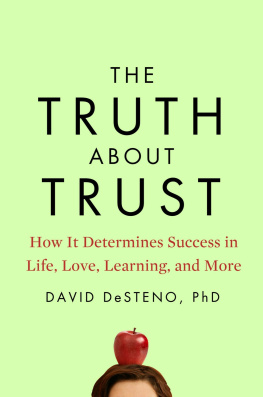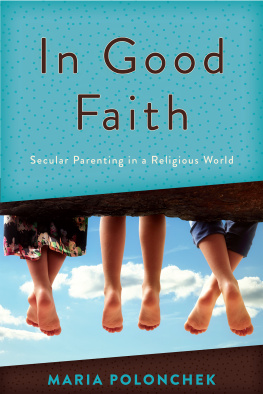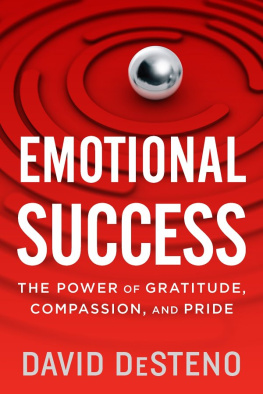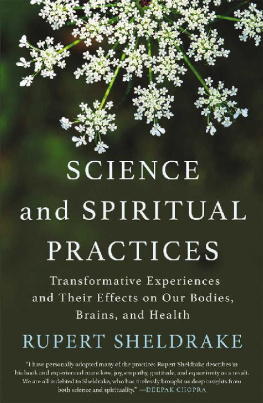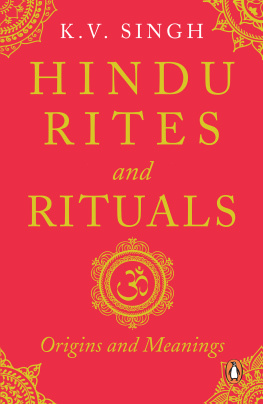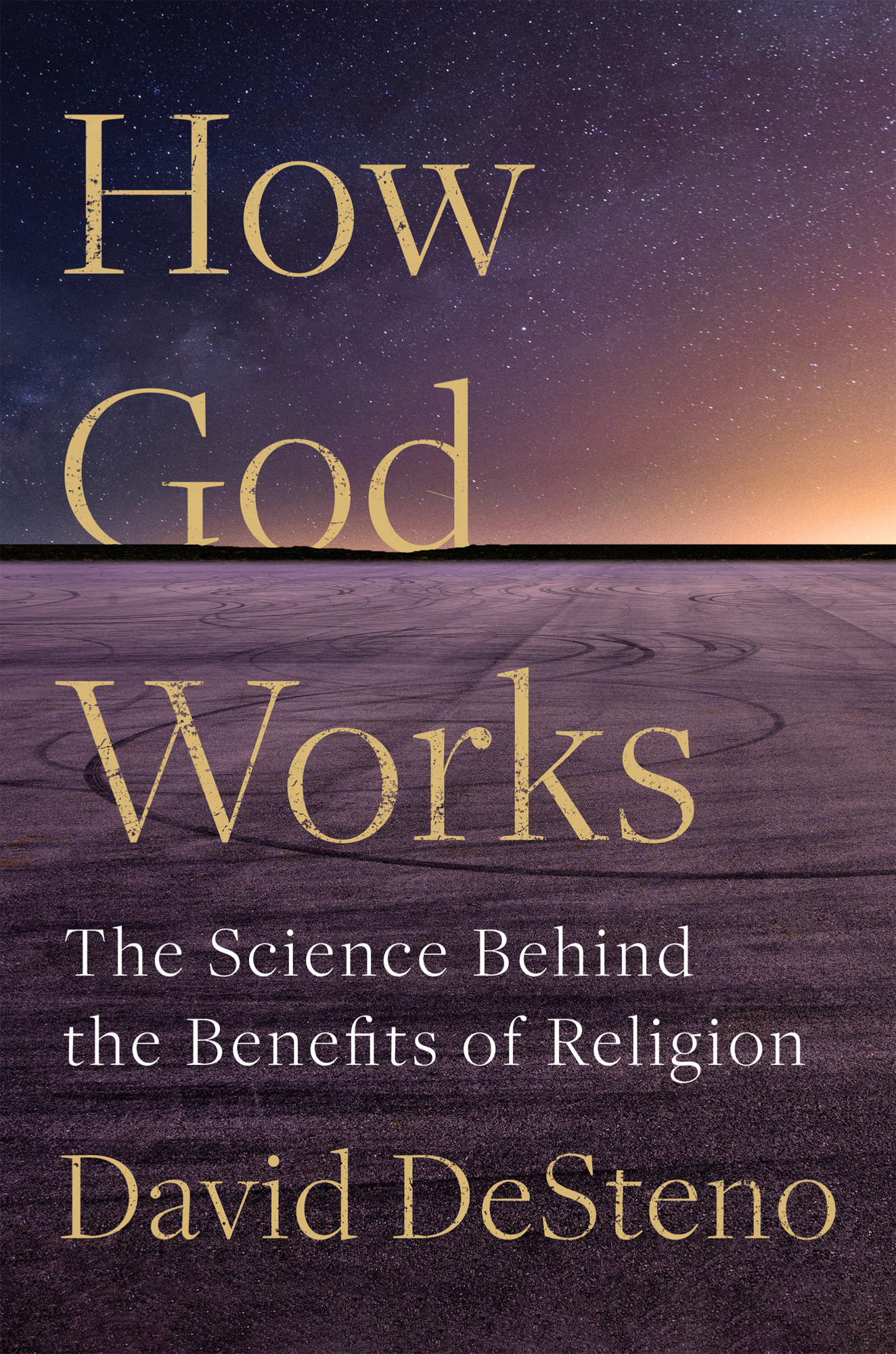Contents
Guide
How God Works
The Science Behind the Benefits of Religion
David DeSteno
The Science Behind the Benefits of Religion
To my family
A Note on Pronouns
When you write about God, pronouns can be a problem. I thought about using they, as it is now frequently done when one is uncertain of the gender or to include all possible genders. But when writing about different religions, some of which have a single deity and some of which have multiple, that also proved confusing. Ultimately, I settled on a two-part strategy, one that I hope youll understand as showing respect both for the unknowable nature of God(s) and for specific religions views of the divine. When Im discussing God or gods in general, Ill use It and they, respectively. But when Im discussing the deity of a specific religion, Ill use the pronoun that faith typically applies.
Introduction The Journey Ahead
H ow do you raise a child to be a good person? What are your responsibilities to your family, your friends, and your community? How do you cope with a serious illness? Can you find someone to love and, if you do, how do you go on when theyre gone? How do you find joy and meaning in lifeespecially in difficult timesand how do you make sense of your lifes inevitable end?
These are the questions that keep people up at night. They strike at the heart of what it means to be human. And so they keep me up at night too. Not only because Im trying to figure out, like millions of others, how to live a good life. But also because for the past thirty years my career has focused on uncovering ways to help people become more moral, more compassionate, and more resilient as they walk the road of life.
That might be surprising, as Im not a priest, therapist, or life coach. Im a research scientist. I conduct psychological experiments. And few people would expect to find the meaning of life through scientific investigation and lab work.
For millennia, most people have turned to priests, ministers, rabbis, and imams to help them deal with grief and loss, birth and death, morality and meaning. And many still turn to a traditional faith or seek out new modes of spirituality to address the challenges and opportunities that life presents.
But over the past few decades, science has started finding ways to help people deal with these issues too. Psychologists like me study things like generosity, empathy, resilience, and forgiveness. And as scientists learn more about what helps foster these feelings and behaviors, we can also suggest practical steps that people can take to improve their lives.
This data-driven approach may seem at odds with religion. Indeed, even though I was raised Catholic, for most of my adult life, I didnt pay religion much heed. Like many scientists, I assumed it was irrelevant to my work.
Yet, over the years, as I continued to scientifically study the questions that fascinated mequestions about how to improve the human conditionI was surprised that many of the answers I found aligned with religious ideas. Even more surprising to me was that certain aspects of religious practices, even when removed from their spiritual settings, had a profound impact on peoples minds.
My research team found, for example, that giving thanks to one person (or to God) made people more honest and generous to othersnot only to those they cared about but also to strangers. We saw that just a few weeks of meditation made people more compassionatemore willing to jump out of their seats to aid others in pain and to resist lashing out at people who might otherwise provoke them to violence. To our surprise, we found that even basic parts of many religious rituals, like moving or singing together, made people feel more connected and committed to one another.
Other researchers have discovered that religious practices can lessen anxiety, reduce depression, and even increase physical health. In fact, much of what psychologists and neuroscientists were finding about how to change peoples beliefs, feelings, and behaviorshow to support them when they grieve, how to help them find connection and happinessseemed to echo ideas and techniques that religions have been using for thousands of years. To my growing curiosity, I realized that we scientists were discovering many things that others had realized and implemented long ago.
Thats when it dawned on me: we were going about this in the wrong way. I realized that the surprise my colleagues and I felt when we saw evidence of religions benefits was a sign of our hubrisborn of a common notion among scientists: all of religion was superstition and, therefore, could have little practical benefit. Yet, as I learned and as this book shows, spiritual leaders often understoodin ways that we can now scientifically confirmhow to help people live better. Social scientists are the new kids on the block.
Ironically, around the time I started having these thoughts, a larger cultural battle between science and religion was again heating up. Fundamentalist faiths were casting science as a misguided or even malevolent source of information. Prominent scientists were arguing the reverse: religion wasnt only wrong, it was dangerous. The New Atheist movement, led by eminent thinkers like Richard Dawkins, Daniel Dennett, Steven Pinker, and Sam Harris, cast religion almost as a plague on the enlightened mind.
But when I looked at the results of my studies and those of other researchers, I saw a more nuanced relationship between science and religion. I saw two approaches to understanding how to improve peoples lives that frequently complemented each other.
Dont get me wrong. I firmly believe that the scientific method is a wonder. Its a framework that offers one of the best ways to test ideas about how the world works. But when it comes to thinking about how to help people through lifes travails, we scientists shouldnt be starting from scratch. Just as ancient doesnt always mean wise, neither does it always mean nave.
I believe this view makes intuitive sense. When it comes to managing the human experience, it would be strange if thousands of years of religious thought didnt have much to offer. As I said, people have long turned to spiritual leaders and religious communities for guidance about how to live well. And even in our increasingly secular era, theres a good reason why people still do. Across the globe, those who regularly take part in religious practices report greater well-being than those who dont. The key point here, though, is easy to miss. Saying youre religious doesnt matter much for health and happiness. Its being religioustaking part in the rituals and practices of a faiththat makes life better.
If we remove the theologyviews about the nature of God, the creation of the universe, and the likefrom the day-to-day practice of religious faith, most of the debates that stoke animosity between science and religion evaporate. What were left with is a series of rituals, customs, and sentiments that are themselves the results of experiments of sorts. Over thousands of years, these experiments, carried out in the messy thick of life as opposed to sterile labs, have led to the design of what we might call spiritual technologiestools and processes meant to sooth, move, convince, or otherwise tweak the mind. Its here, in the repetition of prayer, the stillness of contemplation, the joining of hands in celebration or sorrow, the dancing, singing, writhing, and swaying, thatactually or metaphorically, depending on your viewwe can see God at work. To ignore that body of knowledge is to slow the progress of science itself and limit its potential benefit to humanity.


